Friday, 12 December 2008
Sunday, 7 December 2008
Tuesday, 25 November 2008
Sunday, 16 November 2008
Through wars of worlds / invaded by Mars
A couple of weeks ago, October the 30th, was the 70th anniversary of the famous radio broadcast of "The War of the Worlds" adapted from H.G. Wells's novel.
This broadcast not only meant fame for a young Orson Welles, but there were also reports of thousands of frightened citizens blocking telephone lines by calling police stations and news agencies, really believing that the Martians just started an actual invasion of the Earth after having landed at Grover's Mill, New Jersey. Reports talked about mass panic as well, people fleeing their homes and driving miles away to seek shelter. Even though the general atmosphere of tension and anxiety that preceded World War II might have had something to do with these reactions, careful research points out that the reports were intentionally exaggerated by the press, in a time where many newspapers where concerned that radio, a new medium, would make them defunct.
This story is often taken as a proof of North-Americans' gullibility and ingenuousness. Not seldom you can see a self-satisfaction smile along the account of this anecdote, kind of: "Americans, you know...". You may see the same kind of smile on an European when reading "Employees must wash hands before returning to work" in US food court toilets, or when filling up the I-94W immigration form where, after questions like "Do you belong to a terrorist organization?", we are warned that answering YES to any of them might result in denial of our US visa. Sly smiles that come because we think we can see an idiotic society everywhere, to whom what is to be done must be always said, as if people were little children.
One of the things that make you feel bad when you live abroad, when you have to live your life in a different society, is the lack of cultural references, those millions of little details, winks, processes, conventions, that a native knows without being aware of it but that may suppose a big problem for you. Quite often you have the feeling that you are not getting it all right, that there is something that everyone knows but that you ignore, something that turns your mountains into sand corns for the native.
I already wrote about frames and its fragility, and about how they adapt to a new environment without us noticing it. But I am aware that you will never be able to erase this uncomfortable there-is-something-I-am-missing feeling, no matter how many years you live in another country. I think that the lack of the new country's cultural references is one of the toughest problems an immigrant has to face. That's why every help in this direction is more than welcome and having someone telling you how things work, what are you supposed to do, assuming no previous knowledge, no common frame, is a blessing.
The US, and North America in general, are a land of immigrants: there is almost no one there not having an ancestor born outside the US. Maybe that is the reason why every rule has to be stated in a very very clear way. The reason why everything has to be expressed without any margin to wrong interpretation. Maybe the need to harmonize several very different reference frames, and not an idiotic population, is what makes them appear little children to whom everything has to be explained. In a land of immigrants where everyone has its unique bias, its cultural nuances, an accurate setting of the rules of the game with no possible misunderstanding, is a must.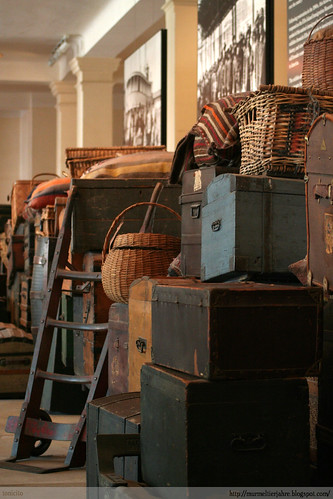
This summer I was, in a short period of time, in New York City and in Paris. And interestingly enough, in New York I never had the feeling of not knowing how to do something, where to wait for my luggage, where to wait for my turn in the lane or what was to be found at its end. A interesting feeling of comfort, as if the path to adaptation into that society had been thoroughly packed down long ago. Some days later, as I arrived in Paris, again in the Old Europe, not only did I need a while to understand where was my luggage, I surprised myself quite often thinking "Merde!, I am missing something again".
Tuesday, 11 November 2008
Thursday, 6 November 2008
Favonius at work
Yesterday morning, as I went out home at 6:45AM, with a scarf around my neck, I was welcomed by an incredibly warm November morning. Even though the Sun had not still risen, we might have had 18ºC! How was that possible? Is it because now, with Obama, it won't be cold in November anymore? ;)
No. It is the Alpenföhn, a unique wind effect that happens near the Alps. When an air mass has to rise to spring over a mountain range, water condenses and falls as rain on the windward side. Past the maximum elevation, the dry air "falls down" the slopes and raises temperatures by as much as 30ºC on the leeward valley.
(Picture taken from Wikimedia Commons)
The name Föhn comes from the Roman God Favonius, who personified the west wind. Later on, it went through Rhaeto-Romance favuogn and fuogn until it reached modern German as Föhn. Interestingly enough, a hair dryer is called Fön, without "h". I read that the name was registered as trademark by AEG on the 20s.
The Föhn is often associated with migraines and psychoses. A study by the Ludwig Maximilian University in Munich claims that suicide and accidents increase by 10 percent during föhn winds in Central Europe. In fact, there is a Föhnkrankheit (Föhn sickness), which might be the perfect excuse to justify low performance on the job, excessive appetite or, simply, general apathy.
Other föhn wind examples around the world include the Chinook in the Rocky Mountains, North America, the Halny in the Carpathian Mountains, Eastern Europe, fogony and cierzo in the Pyrenees and viento del sur (southern wind) in Cantabria, northern Spain.
And I think I'm going to let it go for today, because, you know, there is Föhn today...
Monday, 3 November 2008
Friday, 24 October 2008
Days are getting shorter...
... November is almost here and I already rode my bike to the office for the last time this year ...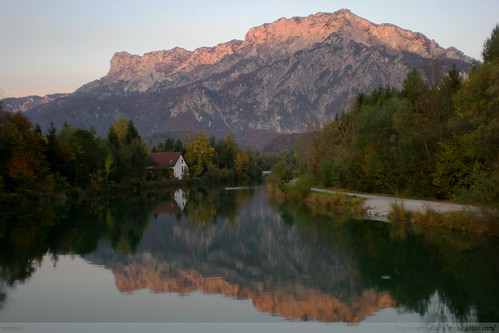
... the Sun strides through its journey in the sky lower and lower, long shadows and wonderful sunset light all day long ...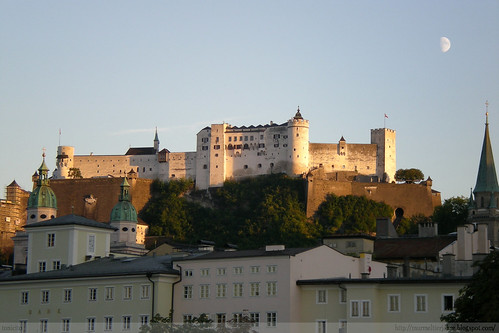
... and Cold and Darkness prepare themselves to rule over the Northern hemisphere for the next months. Strange organic sculptures wander around the city at night ...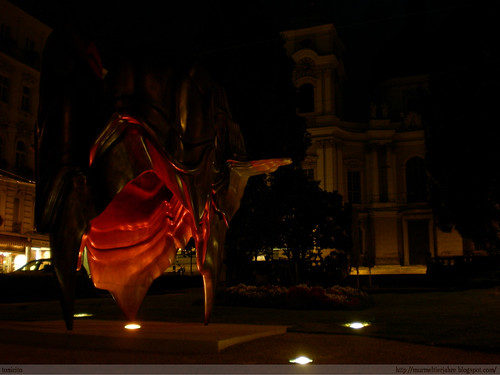
Monday, 6 October 2008
Prime Sickness
I've got a confession to make: I am sick.
It all started almost three years ago, as we got our dSLR. The dandiest feature of such a device is the interchangeability of lenses. At first I was quite happy with the kit lens, but after a year a mid-range telephoto zoom lens followed, in order to get a closer look to things.
During our stay in New York City, I could not help but pay a visit to B&H, kind of the mother ship for all photographers, either hobby or professional. In addition to a little camera gear, basically lens hoods (because size does matter! :D) some filters and memory cards, I got myself a 50mm prime lens, which ultimately confirmed my sickness: I am crazy about photo lenses and camera gear.
There are a couple of great things about standard prime lenses. First of all, they have far better optical properties than a zoom lens. The reason for that is very simple: the designer of a zoom lens is forced to meet a number of trade offs to deliver an acceptable quality in all its focal range. A prime lens, having a single focal length, can be optimized to get the best possible image quality for that particular focal length.
In addition, the optical system of a prime lens is plain simple and elegant, and yet works perfectly. This is something that I've always been fascinated about, like the functioning of a bicycle: so simple that everything can be understood at a glance and yet unsurpassed when it comes to energy efficiency. Due to this simple lens system, prime lenses are very fast (that means, they let lots of light go through), which is great for night photography, but also great to achieve hair-thin depths of field.
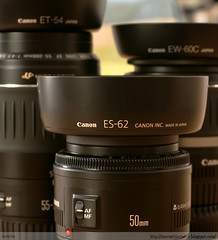
But to me, the greatest thing about a prime lens is that it has no zoom. Don't get me wrong, I find zooms are great and for some purposes totally irreplaceable, but I think zooms make us lazy as well. Why bother getting closer to our subject if we can get something similar just by turning the zoom ring? Being bonded to a fixed focal length, on the other hand, means that our photographic creativity is pushed forward because we have to move forward or backwards to get a nice picture composition, to apply the rule of thirds or whatever.
At first it felt strange, and my fingers often tried to turn the zoom ring when using the 50mm lens. But I quickly got used to it, and learned to use it and love it! Because it feels good, it feels like I'm doing real photography out there, it's a little like returning to the origins, back in time, when there was no digital, no reflex mirror, no memory cards, no USBs, no chance to look immediately at your pictures, no histograms, no program modes, no autofocus, no GIMP.
A prime lens is just the right lens for this time of year, when diminishing chlorophyll amounts make place for wonderful brown, yellow, orange and red pigments that have been waiting patiently all summer long to make their triumphant entrance.
Farewell Ms Chlorophyll! Welcome Mr Carotene and Ms Xanthophyll!
Saturday, 4 October 2008
Unpronounceable
When Austria entered the European Union in 1995, a request was made to recognise Austrian as an own language, independent from German. The EU experts replied that, except for a number of own words, most of them related to food, there were not enough differences between Austrian and German language to consider them independent.
One of these own words is today's favourite word. Zwetschken are a subspecies of plums (Prunus domestica domestica), bitter a bit acid in taste, which are in season right now. The German word for plums, in general, is Pflaume, but they are called Zwetschken in Austria.
And what is so funny about this word? If we count the number of vowels and consonants, we obtain proud 8:2 for the consonants. A nightmare for a Romanic language native speaker.
Many years ago, walking around Vienna on a cold October with a co-worker, we realised that the cold numbed our tongues and lips, making it really difficult for us to speak normally, as if we were coming from the dentist and anesthesia was still doing its thing. And right there we devised a theory: languages spoken on colder climates have to tend to be more guttural, because a guttural sound is easier to pronounce in a cold environment. On the other hand, languages from more benign climates can afford a richer articulation and pronunciation.
Is our theory right? I don't know, but I know for sure that some words will keep being a challenge for a long long time...
Sunday, 28 September 2008
Rache des Papstes
The reflection of the Sun, capricious, appears in the form of a cross on the steel dome of Berlin's Fernsehturm. Considering this building was the crown's jewel for the GDR socialist government, whose principles were profoundly atheist, it is easy to imagine how inopportune this effect was. The legendary Berliner humour quickly referred to the reflection as „Rache des Papstes“ (the Pope's revenge).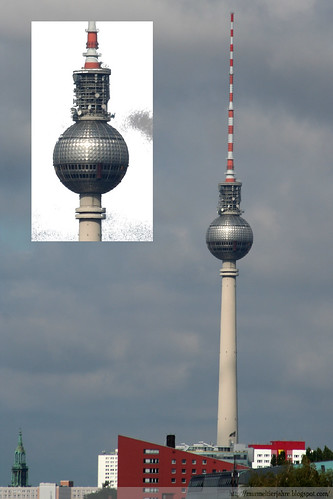
It is said that the dreadful Stasi questioned the tower's architect to be sure this was not something he planned and carefully designed on purpose. I read one of the Government officers ended the long discussions about the topic with the words „Das ist kein Kreuz, sondern ein Plus für den Sozialismus!“ ("That's not a cross, but a plus for Socialism!")
The elegant silhouette of the Fernsehturm, with or without cross, is a view that always make me smile, because it means I am in Berlin, one of the cities where I can picture myself living.
Thursday, 25 September 2008
The American Way
When travelling to the United States, Lufthansa offers some practical advice on how to complete the I-94W immigration form. Among other tips, it is recommended for European visitors to write numbers the American way, and not the European way, so that no misunderstanding can happen with immigration officers. 
In spite of a lot of striking similarities, especially if you compare North-Eastern America with Central Europe, there is still an awful lot that's done differently on each side of the Atlantic Ocean.
The one thing that appeared most evident to me is that North Americans talk. A lot. It does not really matter if they know you or not. They are eager and willing to talk to table neighbours in a bar, spontaneously offer help if you just seem to be a little lost, ask you about your country or, simply, listen to your story. Someone told me that if you ask an average North American for the time, you have already made a new friend. And it seems to be true. Not only in lovely small towns at the heart of a National Park, but also in big cities (so big, in fact, that some might consider them capital of the western world).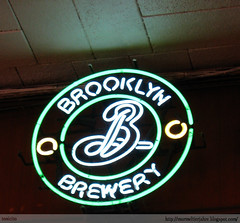
This US people feature might be somewhat surprising to us residents of the Old World, where everyone tends to mind her or his own business and don't care about the others'. Confronted with the true masters of small talk, we felt a little strange at first. But we quickly recognised the advantages of giving conversation to people. Because thanks to perfect strangers that were willing to talk to us, we have been to places that we would never have discovered otherwise.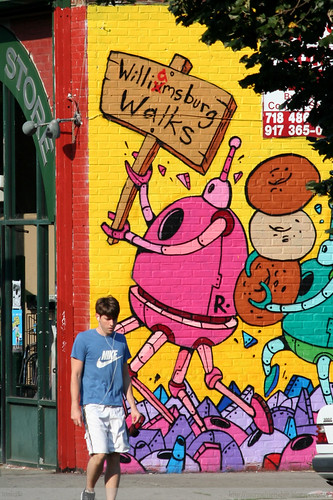
I think the greatness of this attitude is that it ends up in win-win situations quite often, in which both parties get something useful. And even nothing more but a friendly conversation with no obvious chance for anyone, it is still a nice experience. Either way, such an approach to social relations lets North Americans being open to new opportunities, to unexpected chances, practising actively the so-called "networking". Its principle is to establish contacts between people you know, who might be interested in knowing each other, whatever the reason. That way, the tremendous power of exponential growth is put to work for us.
A week before travelling to the States, I was waiting to get my international driving license at the ÖAMTC (the Austrian Automobile Association) in Salzburg. An old lady in front of me was asking for road information for her vacation, and I heard she asked about destinations on the coast between Barcelona and Tarragona. I smiled and waited for my turn. As I later got my license and went out, I saw she was still there at the parking lot, and I thought on approaching her and tell her that Tarragona is my birthplace and offer her some more advice. But, you know, I'm a little shy and do not feel really comfortable starting conversations with strangers, so I just unlocked my bike and rode away.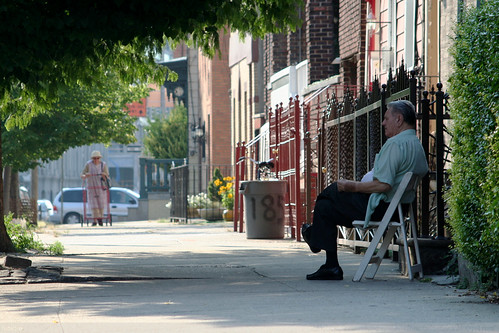
And I almost immediately regret not having talked to her, because nothing bad could have happened, she would have get first-hand information about the region from a native and, who knows?, probably I would have got something from her, even just the satisfaction of helping someone would have been fine. But no.
Maybe next time?
Sunday, 21 September 2008
Sunday, 7 September 2008
Underwater
There is a small country in Micronesia that I feel especially bond to. The island nation of Palau consists of 8 major and some 250 minor islands, has less than 20000 inhabitants and its highest point is less than 250 meters.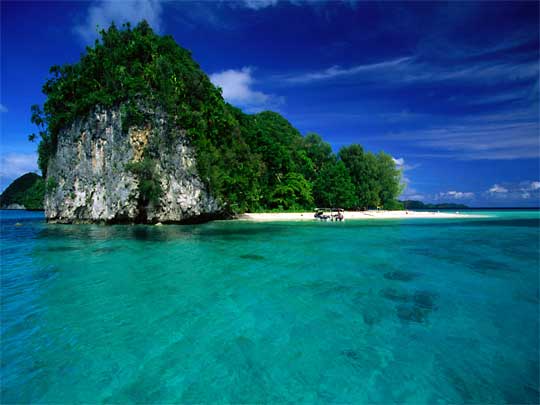
(picture: lonely planet images)
It is not difficult to imagine how do Palauans (and most of the islanders in the world) feel about ice melting on the Poles and the accelerating sea level rise associated. Many countries, like Palau, are going to see their coastlines dramatically affected. Other nations will simply cease to exist.
That's why Palau and some other small islands are willing to present a resolution calling on the UN Security Council to address climate change as a pressing threat to international peace and security. Avaaz, an international NGO, started raising signatures to help support these small islands. I believe the first step to solve a problem, maybe the most important one, is to realize that we have a problem.
(picture: woody1778a)
Many years ago my father received a post offer to buy a special edition of all stamps of the Republic of Palau, which was being offered to people bearing this name around the world. He did not take the offer at the time, although he lamented not having done so afterwards.
I always thought maybe some day I would receive such an offer, too. I really hope that it is not too late for Palau and for all threatened small islands around the world.
Saturday, 23 August 2008
Traffic Lights
It's funny how everyone has myths and fetishes. For many it is woman's shoes, others prefer Broadway musicals and some loose their minds for music boxes or cheesy souvenirs in transparent balls where thousand glittering little stars simulate snow...
In my case, I'm crazy about taking pictures of traffic lights.



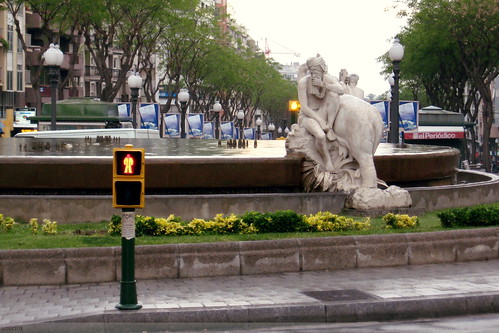




What is wrong with me?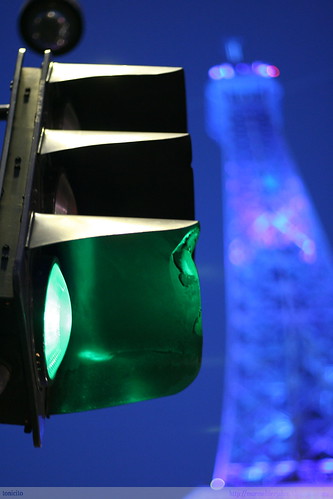
Saturday, 16 August 2008
Gotham impressions
It is said that as in New York it is 3 in the afternoon in Europe it is 9 PM of ten years before.
In spite of its relatively short history as a city (the Dutch founded New Amsterdam on Manhattan's southernmost tip in 1624), you get the feeling you find yourself right in the middle of a place where big things happened and continue to happen. As if the History, to compensate for a late start, raced by at vertiginous speeds.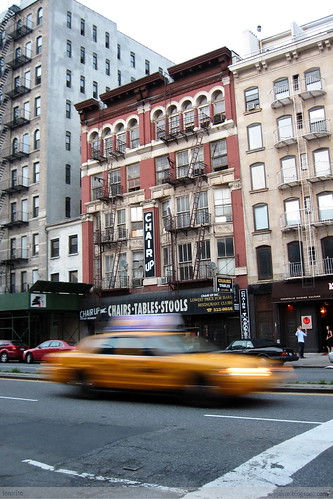
That's maybe the reason why New Yorkers live fast: people talk fast, people eat fast, cabs drive fast, pedestrians walk fast, people laugh fast and, I guess, they dream fast. Or maybe it is the other way around, and it is precisely them who accelerate the Big Clock's pace with their uncorrectable crossing in red and their never ending horn symphonies.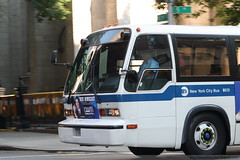
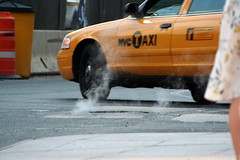
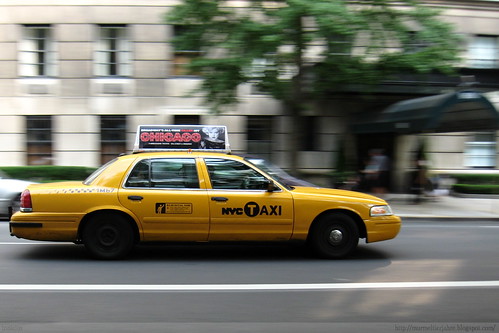
New York City has a soul, even though the multiple and surprisingly contradictory identities she possesses, turning one into the other as you walk few steps, even as you cross to the other side of the street. This is nothing new, though. Visitors to the seventeenth century Dutch settlement marveled that eighteen separate languages were spoken on its streets at a time when its total population was below one thousand. But New York City has a young and strong soul. You just need to stand in the middle of the street, in the middle of the roar, to feel its powerful beat below your feet.
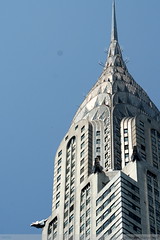

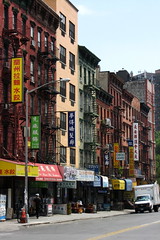
New York City conveys a strange feeling of familiarity in all her faces, in all her images. No matter where you look at, a known icon will impress your retina, the frame of that one movie, a picture that maybe never existed, but which was long ago digested by the collective subconscious after decades of audiovisual exports. 

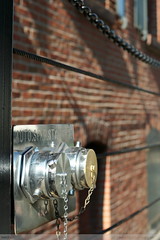

As you walk out the door, you face the most difficult decision of the day: should we turn to the left (to the south, downtown) or to the right (to the north, uptown)? But in fact it's the same, because this city is great in all directions.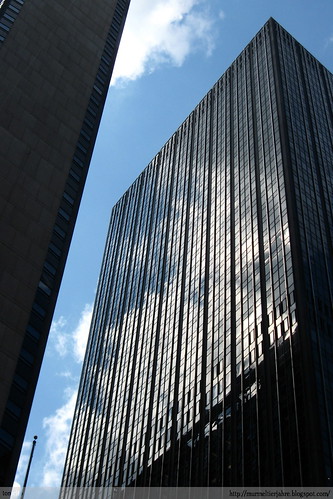
It is said that comic editors gave instructions to new illustrators and writers to help them with the locations for their stories. Metropolis, Superman's city, is Manhattan's Midtown on a sunny day at noon. Gotham, Batman's city, is Downtown Manhattan on a rainy night. And Harlem is Harlem, of course. We could walk around Metropolis to exhaustion. But unfortunately we did not get the chance to see Gotham. The only time it rained we were in Harlem.
Sunday, 3 August 2008
The City (with a capital C)
We've just come back from the City with a capital C, the city that all the other cities wish they were.
In his Historias de Nueva York (New York Stories), Enric González tells that, in order to survive in The Big Apple, you need to have good luck.
As we arrived to the apartment we had this last week, the owner, Chris (who, incidentally, could perfectly appear in a Paul Auster novel) wished us Good luck!
And it was in that same moment that I knew, although I did not dare saying it loud, that everything would be perfect, and that we were going to miss that city as soon as we take the train to the airport. And so it has been.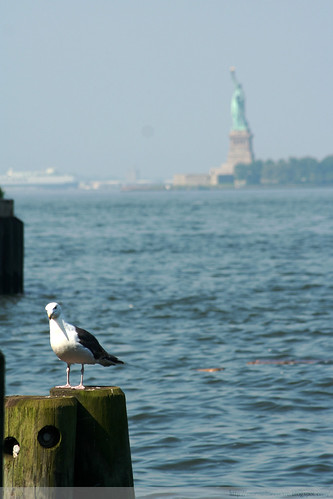
I have not been able to sleep for 28 hours now. Clearly, sleeping in planes is not my thing. I hope tomorrow I am some more of a person and tell something more. Until then, good luck!



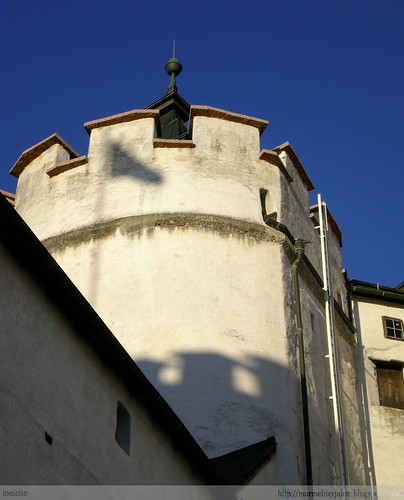
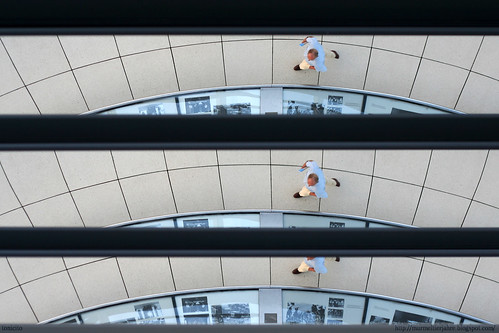




 versión en español
versión en español






